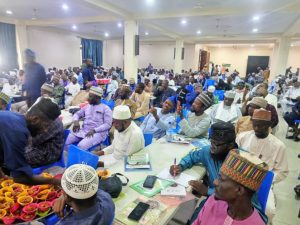A growing wave of advocacy for youth inclusion and reform in Islamic leadership took center stage at the Annual Imams Conference hosted by the Lekki Muslim Ummah (LEMU) on Thursday, May 1, 2025. The well-attended event drew Islamic scholars, youth leaders, and mosque administrators from across Nigeria, reflecting a noticeable increase in Imam participation in recent years.
Delivering a keynote address on the theme “Imams, the Youths and the Law,” respected scholar and Lead Consultant at AS & Associates, Dr. Abdullahi Shuaib, urged mosques across Nigeria to establish youth councils as a bridge between Islamic leadership and young Muslims. He described the generational disconnect as “alarming,” emphasizing that traditional mosque leadership styles often fail to resonate with youths living in an increasingly globalized, digital world.
“Our youths are exposed to a fast-paced, interconnected environment influenced by social media, diverse ideas, and evolving values,” Dr. Shuaib said. “Yet, many Imams still rely on classical Arabic expressions and sermons disconnected from pressing youth concerns like mental health, identity, career development, or online ethics.”
He called on Imams to engage youths more directly by involving them in sermon planning, mosque governance, and other community-building activities. “When young people are part of decision-making, they develop a sense of ownership and responsibility,” he added.

Addressing contemporary moral issues, Professor Abdurraheem Adeleke, a legal scholar from Lagos State University (LASU), cautioned against the increasing trend of egg donation among female students. He declared that, according to Islamic teachings, both egg and sperm donations are prohibited, as they disrupt the principles of lineage and family in Islam.
“Blood donation is permissible because it regenerates and can save lives,” said Prof. Adeleke. “But reproductive donations are fundamentally different. They create lineage outside of the legal bounds of marriage, which is against Shari’ah.” Citing both Islamic and English law, he warned that using one’s reproductive material outside of marriage may be tantamount to adultery.
The host of the conference, Chief Imam of Lekki, Dr. Ridwan Jamiu, emphasized the need for Imams to continually upgrade their knowledge and preaching methods. He described the conference as a “train-the-trainers” initiative aimed at equipping religious leaders to effectively communicate with contemporary audiences, especially the youth.
“The world is evolving. Our approach to da’wah must also evolve to remain effective and relevant,” Dr. Jamiu said. “Preaching in ways that young people understand is not a compromise of values, but a necessary adaptation.”
Professor AbdulKareem Olatoye, also of LASU, delivered a goodwill message commending LEMU’s efforts in fostering collaboration between religious leaders and youths. He urged Muslims to embrace the trials that come with religious reform and spiritual growth.
“There’s no meaningful progress in our deen without enduring some difficulty,” he said. “The Qur’an encourages cooperation in righteousness and knowledge—not isolation or rigidity.”
The LEMU Annual Imams Conference continues to grow as a national platform for Islamic leadership development, encouraging reflection, collaboration, and meaningful dialogue on how mosques can adapt to meet the needs of a new generation.